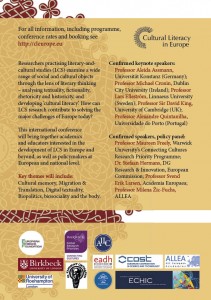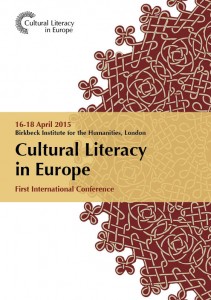From Literature to Cultural Literacy
Edited By Naomi Segal and Daniela Koleva
Coming September 2014!
Special Offer – 30% off with this flyer!
See the publisher’s website.
About the book
In current contexts one can be a literary scholar and yet be working on objects other than poems, dramas or fiction. Something has happened to both the researchers and the discipline that has transformed this humanities domain, bringing it into a sharper focus and investigating the readability of contemporary global social issues. The essays in this book, written by scholars from ten countries, range across this research domain, renamed ‘literary-and-cultural studies’, or LCS.
LCS depends on four key concepts – textuality, fictionality, rhetoricity and historicity – which characterize both the material and the methods of their research. The seventeen essays look at four broad fields: cultural memory; migration and translation; electronic textuality; and biopolitics, biosociality and the body. The aim of the collection is to deploy and enhance cultural literacy, a way of looking at social and cultural issues – especially issues of change and mobility – through the lens of literary thinking.
Contents
- Introduction; Naomi Segal
PART I: REMEMBERING AND FORGETTING
- 1. Section Introduction; Daniela Koleva
- 2. Visual Recall in the Present: Critical Nostalgia and the Memory of Empire in Portuguese Culture; Isabel Capeloa Gil
- 3. Textualized Memories of Politics: Turkish Coup d’état Novels; Sibel Irzık
- 4. Can Developers Learn from Art? Janet Cardiff’s ‘The Missing Voice’ in Spitalfields; Ricarda Vidal
PART II: MIGRATION AND TRANSLATION
- 5. Section Introduction; Loredana Polezzi
- 6. Migrant Poet(h)ics; Borbála Faragó
- 7. Translating the In-Between: Literatures of Performance and the Relationship between Language, Literature and Society; Robert Crawshaw
- 8. Lost (and Gained) in Migration: the writing of migrancy; Mary Gallagher
PART III: ELECTRONIC TEXTUALITY
- 9. Section Introduction; Leopoldina Fortunati
- 10. Non-Consumptive Reading; Susan Schreibman
- 11. Reading (and Writing) Online, Rather than on the Decline; Kathleen Fitzpatrick
- 12. I Fought the Law: Transgressive Play and the Implied Player; Espen Aarseth
PART IV: BIOSOCIALITY, BIOPOLITICS AND THE BODY
- 13. Section Introduction; Ulrike Landfester
- 14. Human Enhancement: is it ‘Mere’ Science Fiction? The Rise and Rise of Disembodied Ethics; Heather Bradshaw-Martin
- 15. History in the Gene? How Biohistories are Implicated in Biopolitics and Biosocialities; Marianne Sommer
- 16. Between Hybrid and Graft; Uwe Wirth



